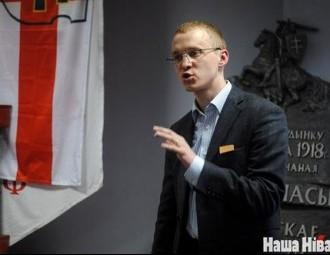Dashkevich, Lobau and Tsianiuta became the leaders of Malady Front
 photo by Nasha Niva
photo by Nasha Niva
On October 26 Minsk held VII Congress of Youth patriotic organization “Malady Front”.
Former political prisoner Zmicier Dashkevich remained at the helm of Malady Front as a result of Saturday’s convention of the opposition youth group, despite announcing earlier his plans to quit the organization, BelaPAN reports.
The delegates to the convention voted to replace the post of chairperson with four co-chairpersons, and Mr. Dashkevich, 32, who had chaired the group until the convention, was elected one of them. Eduard Lobau, who is currently held in prison on what is widely viewed as a politically motivated charge, and Andrei Tsianiuta were elected two other co-chairmen. The fourth position is expected to be filled as a result of another convention that Malady Front plans to hold before the end of this year.
Speaking about why he had changed his mind and remained a leading member of Malady Front, Mr. Dashkevich pointed to infighting in the organization. At the same time, he said, Malady Front members have no strategic differences. “Well, they didn’t sort something out, had some disagreements. I believe it will benefit democracy within the organization,” he said.
Mr.Dashkevich promised to do his “utmost” to revive the organization. “I will tour entire Belarus despite any bans, I will hold events despite any preventive supervision rules,” he said.
Mr. Dashkevich is under "preventive police supervision" after the completion of his prison term and release on August 28. The supervision term will expire in late February.
Let us recall that Zmicier Dashkevich was arrested in Minsk on December 18, 2010, on the eve of a scheduled large-scale post-election demonstration. On March 24, 2011, he was sentenced to two years in a minimum-security correctional institution on a charge of "especially malicious hooliganism."
In September 2011, he refused an offer of freedom in exchange for asking Aliaksandr Lukashenka for a presidential pardon.
Mr. Dashkevich was repeatedly placed in disciplinary confinement and transferred to other prisons for allegedly violating prison rules. As a result of two trials, he had his prison term extended to August 28, 2013, and ended up in a cell-type prison in Hrodna. Amnesty International recognized him as a prisoner of conscience jailed for his political views.
Chairman of “Young Front” youth organization was released from prison on August 28, 2013.
-
03.01
-
07.10
-
22.09
-
17.08
-
12.08
-
30.09








































